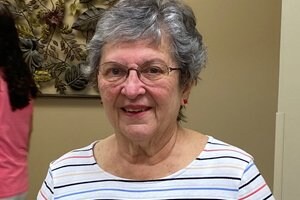Phyllis Rotter’s Story
 For the first time in their 57 years of marriage, Phyllis Rotter’s husband, Russell, is the one planting the couple’s vegetable and flower gardens at their Amana home. However, by the time the vegetables are grown and ready to harvest, Phyllis, 73, is counting on being the one to do it.
For the first time in their 57 years of marriage, Phyllis Rotter’s husband, Russell, is the one planting the couple’s vegetable and flower gardens at their Amana home. However, by the time the vegetables are grown and ready to harvest, Phyllis, 73, is counting on being the one to do it.
Unfortunately, a stroke in late March interfered with many of the things Phyllis loves doing – gardening, needlework, cooking and so much more. But, she’s determined to get back to her favorite activities – she hopes by summer’s end.
On March 28, Phyllis remembers waking up in the middle of the night with a terrible headache, so she took some Tylenol and went back to bed. Then, when she got out of bed the next morning, she fell; Phyllis said her right leg was numb and wouldn’t hold her up. As a retired nurse, she knew she needed to get to the hospital.
“Having a stroke was the farthest thing from my mind, until I couldn’t walk,” Phyllis said. “My right leg just wasn’t cooperating, but I still didn’t think it was a stroke.”
Tests conducted in Mercy’s Emergency Room revealed otherwise. Phyllis had suffered a stroke.
She spent more than three weeks in the hospital at Mercy. During that time, in addition to her stroke, doctors identified that Phyllis had blockages in her heart, and she was experiencing atrial fibrillation, or Afib. For the Afib, Mercy electrophysiologist Mark Milton, MD, placed a pacemaker, while cardiologist Ryan Hollenbeck, MD, placed two stents to open up the arteries in her heart.
As she recovered, Phyllis spent the majority of her time as a patient in Mercy’s Inpatient Rehabilitation Unit (IRU).
“Everybody on the rehab unit was just marvelous,” Phyllis said. “They helped me with everything. I had to learn to walk; balance; and practice simple, everyday tasks. I also needed speech therapy because the right side of my face drooped, and I slurred my words.”
Phyllis said the IRU staff encouraged her every step of the way.
“Every little movement was an effort for me,” she said. “But, they always made me feel like I was doing a great job. They praised even the tiniest accomplishments. I just can’t say enough positive things about how they helped and encouraged me.”
Phyllis said even the smallest gestures by IRU staff were impressive and memorable. She recalls mentioning to a tech that she enjoyed the smell of the coffee from the nurse’s station. Moments later, the tech was back in her room with a cup of hot decaf coffee – just the way she liked it. Every day after that, without her even asking, he would arrive with her coffee. It’s that kind care and attention, Phyllis said, that really sets Mercy apart.
As evidence of its excellent care, Mercy’s Inpatient Rehabilitation Unit was recently awarded the Uniform Data System (UDS) for Medical Rehabilitation Top Performer Award in recognition of its outstanding rehabilitation program performance.
In 2020, Mercy’s IRU received a three-year accreditation from CARF International (Certified Acute Rehab Facility), which was earned in the midst of the COVID-19 pandemic. CARF-accredited facilities must meet the most rigorous standards and show a demonstrated commitment to the best patient care.
“We strive to take excellent care of our patients and we have good outcomes,” said IRU Medical Director, Carla Schulz, MD, FAAFP. “Ranking in the 97th percentile proves just what remarkable teamwork can do. This award recognizes that the care we provide to our patients is effective, efficient and patient-centered.”
On April 19, Phyllis was able to be discharged from the hospital and return home. There, her husband helps her with the daily activities that are still difficult for her. She also receives Mercy physical and occupational therapy at home several times a week. She’s eager to get better and back to her daily activities.
“Sometimes, I get so discouraged, but I still have a lot of people encouraging me and working with me to reach my goals,” Phyllis said. “I’m happy with how far I’ve come, but I know I still have a long way to go.”
Phyllis has two needlework projects in the works for her grandchildren that she hopes to complete once she’s able. And, harvesting the vegetable garden remains toward the top of her list of goals.